Module 11 Unit 1 They touch noses(内嵌听力音频课件+希沃版课件)(外研七下Module 11 Body language)
文档属性
| 名称 | Module 11 Unit 1 They touch noses(内嵌听力音频课件+希沃版课件)(外研七下Module 11 Body language) |
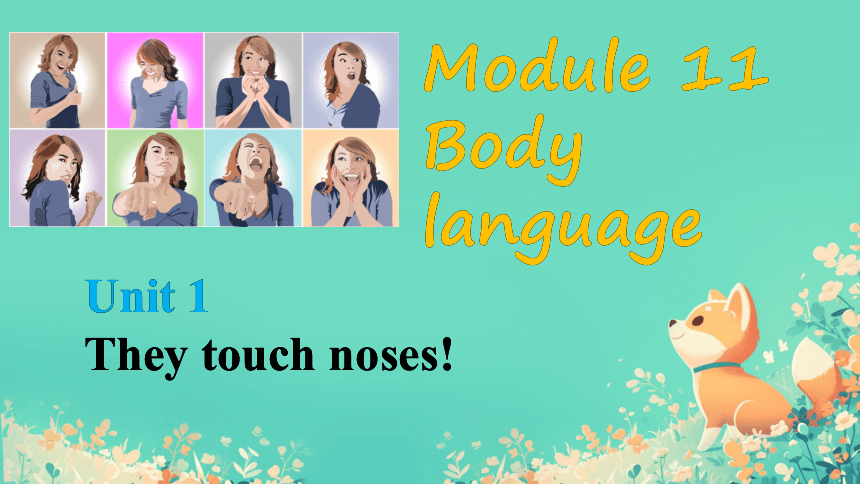
|
|
| 格式 | zip | ||
| 文件大小 | 88.7MB | ||
| 资源类型 | 试卷 | ||
| 版本资源 | 外研版 | ||
| 科目 | 英语 | ||
| 更新时间 | 2024-06-04 00:00:00 | ||
图片预览

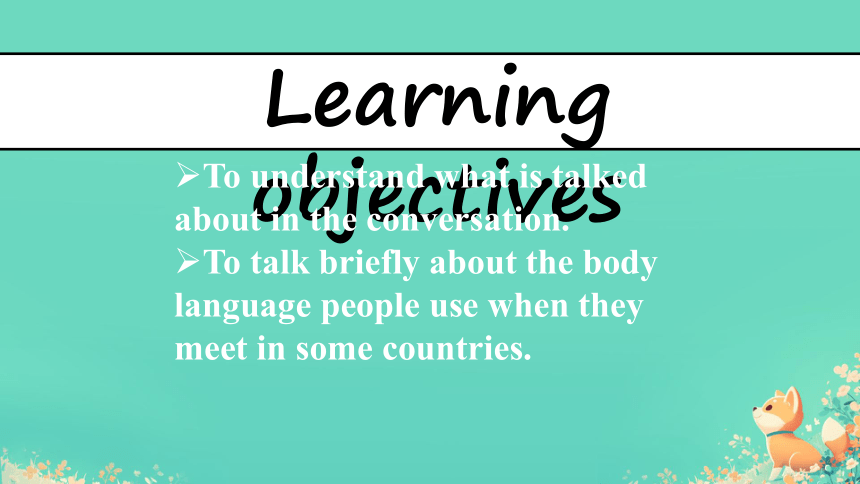
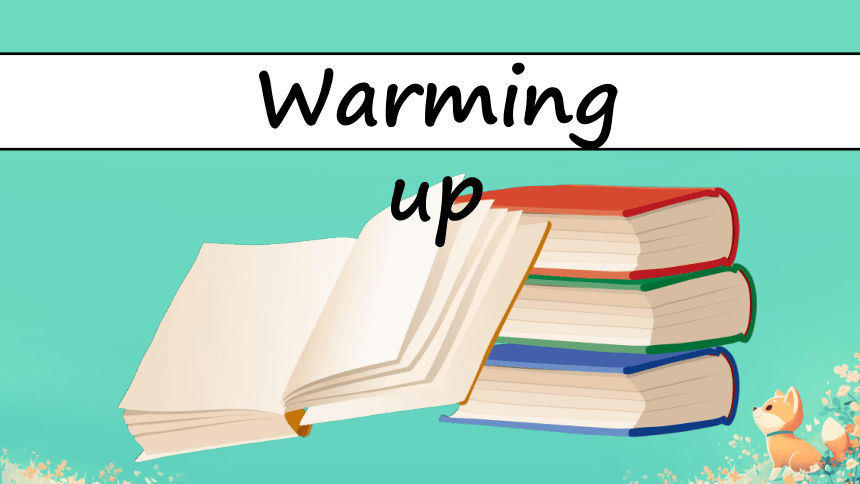
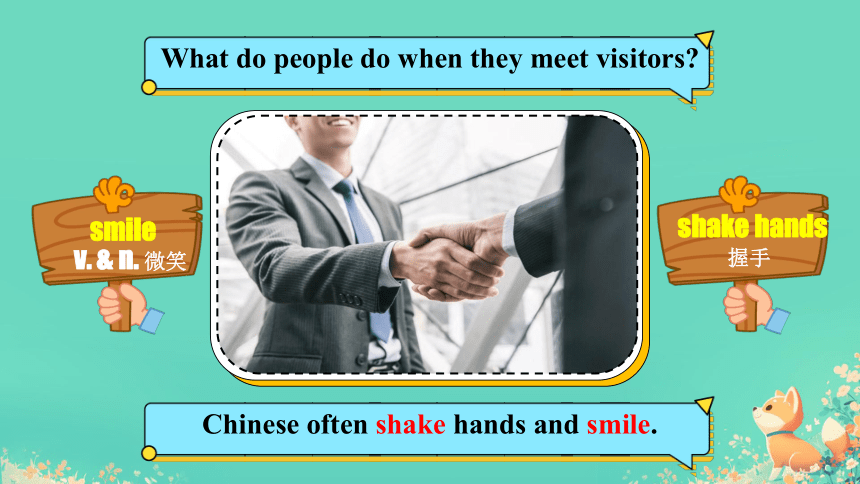
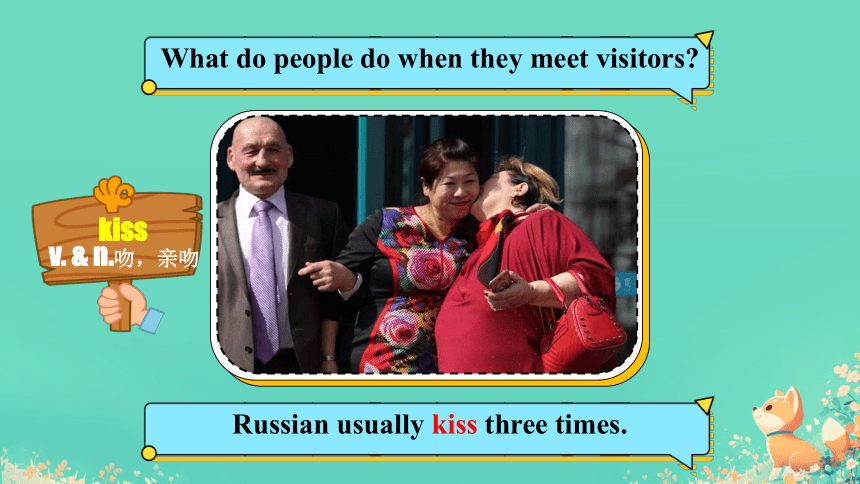
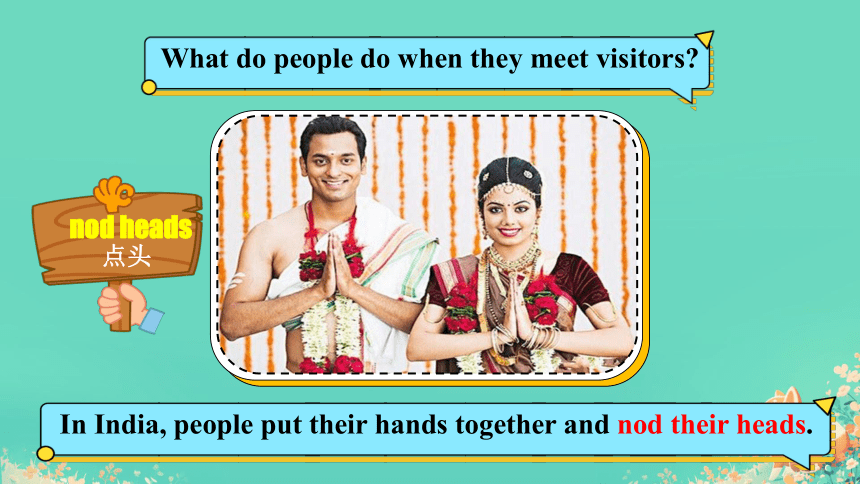

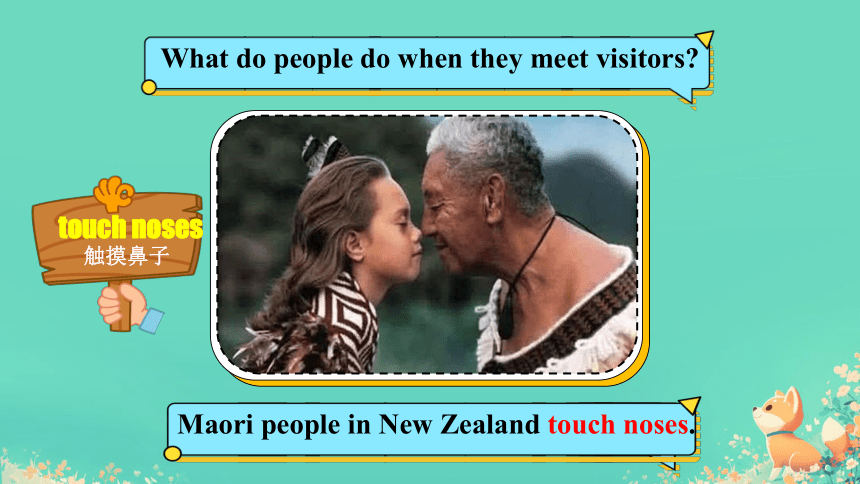
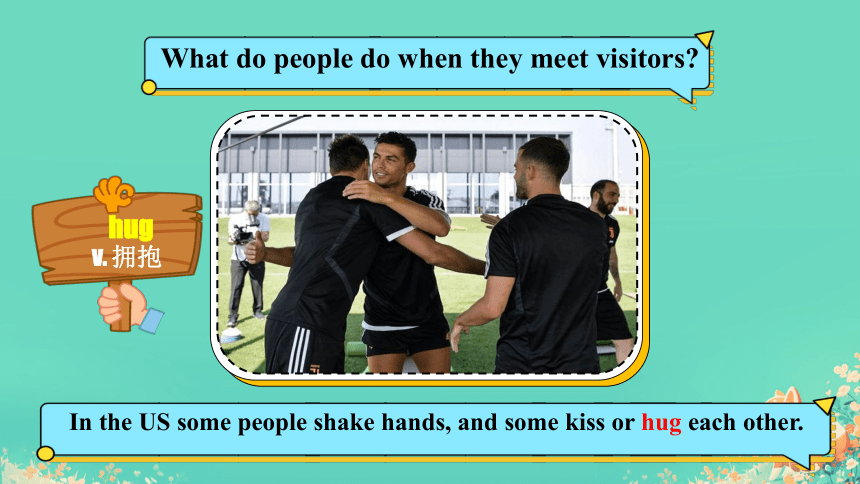

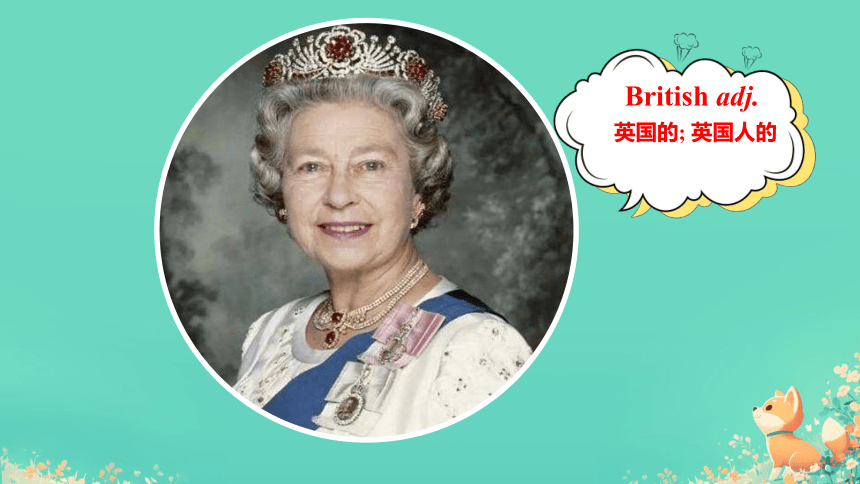

文档简介
(共55张PPT)
Unit 1
They touch noses!
Unit 1
They touch noses!
Unit 1
They touch
Module 11
Body language
Module 11
Body language
Module 11
Body language
Learning objectives
To understand what is talked about in the conversation.
To talk briefly about the body language people use when they meet in some countries.
Warming up
What do people do when they meet visitors
Chinese often shake hands and smile.
shake hands
握手
smile
v. & n. 微笑
What do people do when they meet visitors
Russian usually kiss three times.
kiss
v. & n.吻,亲吻
What do people do when they meet visitors
nod heads
点头
In India, people put their hands together and nod their heads.
What do people do when they meet visitors
bow
v. 鞠躬,弯腰
Japanese smile at each other and bow.
What do people do when they meet visitors
touch noses
触摸鼻子
Maori people in New Zealand touch noses.
What do people do when they meet visitors
hug
v. 拥抱
In the US some people shake hands, and some kiss or hug each other.
New words
British adj.
英国的; 英国人的
German
n.德国人; 德语
adj. 德国的; 德国人的; 德语的
Japanese n.日本人; 日语
adj. 日本的; 日语的; 日本人的
Russia俄罗斯
Russian俄罗斯人; 俄语 adj. 俄罗斯的; 俄罗斯人的; 俄语的
visitor
n. 游客; 观光者
nod v. 点(头)
head n. 头; 头部
shake v. (shock) 摇晃
each pron. 各个;每个
each other 互相;彼此
together adv. 一起;共同
Listening and vocabulary
Match the pictures with the words and expression from the box.
bow
kiss
shake hands
smile
Discussion:
Which country do the people come from
3
2
1
1/2/3
Listen and match the pictures with the nationality.
British
French
German
Japanese
1
3
Russian
2
Listening to the dialogue and fill in the blanks.
Daming: What are they doing
Betty: They are saying hello. They ____________.
Daming: Are they German Or British
Betty: Maybe they’re French.
Daming: And these people ___________________. I think they’re Russian.
Betty: I think so too. And these people are Japanese, I think.
Daming: Why
Betty: Because they____________ at each other and _______.
are kissing
are shaking hands
are smiling
bowing
Now work in pairs and check.
Example
Are they Russian
Yes, they are.
What are they doing
They’re shaking hands.
Are they French
Yes, they are.
What are they doing
They’re saying hello and kissing.
Are they Japanese
Yes, they are.
What are they doing
They’re smiling at each other and bowing.
Listen and read.
Lingling: We’re going to have some Russian teachers at school tomorrow, and I’m welcoming the visitors. How do I do that
Betty: Lingling, you know, in Russia, people usually kiss three times, left, right, left.
Lingling: What! No, I didn’t know that. We Chinese often shake hands and smile when we meet visitors, and sometimes we nod our heads. But we never kiss. Only parents and children do that.
Listen and read.
Betty: That’s because people do different things in different countries.
Lingling: So what do people in the US usually do when they meet
Betty: In the US some people shake hands, and some kiss or hug each other. In India people put their hands together and nod their heads. And do you know what Maori people in New Zealand do when they meet
Lingling: No. What do they do
Betty: They touch noses!
Read and answer the questions.
1. What’s Lingling going to do
2. Do the Russian and American people greet each other in the same way
She’s going to welcome some Russian teachers.
No, they don’t.
True or False
1. Russian usually kiss the visitors three times, right, left, right.
2. Chinese often shake hands and smile when they meet visitors.
3. Chinese never kiss the visitors.
4. In the US some people shake hands, and some kiss or hug each other.
5. People put their hands together and nod their heads in France.
6. Maori people touch noses when they meet.
left, right, left.
India.
F
T
T
T
F
T
Now complete the table with the correct form of the words from the box.
India kiss Russia together touch visitor
kiss
visitors
India
together
Russia
touch
Learning to learn
People in different countries may use different body language to express the same meaning and feelings. When you speak with people from other countries, try to understand and respect their body language.
Pronunciation and speaking
Chinese each French teacher touch
British shake
people
French
British
Listen and repeat.
Work in groups
Talk about what you do and say when you meet:
your teacher
your head teacher
your parents after school
your best friend
your best friend’s parents
your favorite film star
a visitor to your school
an American
a Russian
What do you do and say when you meet your teacher in the morning
I smile and say good morning.
What do you do and say when you meet a Russian
I smile, say hello and kiss each other three times.
What do you do and say when you meet your parents after school
Kiss and hug each other.
Pay attention to the circled expressions.
点头
握手
互相,彼此
把……放在一起
碰鼻
Summary
1. ... in Russia, people usually kiss three times ...
……在俄罗斯,人们通常亲吻面颊三次……
time n. 次 (可数名词)
在英语中,“一次”是once,“两次”是twice,“三次”及以上都用“基数词+times”表示。
【链接】
time n. 时间 (不可数名词)
1) 我每天读三次英语。
I read English ________ ________ every day.
2) 打扰一下!请问现在几点了?
Excuse me! ________ ________ is it now
three times
What time
2. We Chinese often shake hands and smile when we meet visitors,…
我们中国人见到来访者的时候经常握手、微笑,……
shake v. 摇晃
shake hands (with sb.) (和某人)握手
e.g. Don’t shake the cola before drinking.
喝可乐前别摇晃。
Who is shaking hands with your uncle
谁在和你叔叔握手?
【语境应用】完成句子。
1) 喝果汁前请摇匀它。
Please ____________________ before you drink the juice.
2) Mr Smith微笑着和他们握手。
Mr Smith smiled and ____________________.
shake it
shook hands with them
表示“某国人”的名词,单数变复数有以下几种情况:
① 大多数表示“某国人”的名词变复数,符合一般名词的复数变化规律,词尾直接加-s。
如:Americans, Russians等。
② 词尾若为-ese,其单复数同形。
如:Chinese和Japanese。
③ 以-man结尾的复数“某国人”,应将man改为men,
如:Englishmen, Frenchmen。
但German除外,应直接加-s,即Germans。
smile v. 微笑
smile at sb. 对某人微笑
n. 微笑;笑容 (可数名词)
e.g. She left with a smile.
她微笑着离开了。
The boy smiled when he saw his friend. (翻译)
这个男孩看到他朋友时笑了。
【语境应用】完成句子
1) 李婷总是微笑。
Li Ting always ________.
2) 鲁老师刚才对我微笑了。
Ms Lu ________ ________ me just now.
3) 她的脸上有笑容。
There is ________ ________ on her face.
smiles
smiled at
a smile
3. That’s because people do different things in different countries.
那是因为不同国家的人做法不同。
That’s because ... 那是因为…… (后跟句子说明具体原因)
e.g. That’s because it’s late.
那是因为天晚了。
【链接】
That’s why ...也是一个常用句式,后跟句子说明结果,表示“那就是为什么……”。
e.g. That’s why he got the best scores.
那就是为什么他取得了最好的成绩。
4. And some kiss or hug each other.
还有一些人亲吻或者相互拥抱。
each pron. 各个;每个 (两个或两个以上的人或物中的)
可与介词of连用,后接复数名词或代词;each (of ...)作主语时,谓语动词通常用单数;用于复数主语后,谓语动词用复数。
each adj. 每个
用于单数名词前,后接单数动词。
each other 彼此,互相 (后接复数名词或代词作主语时,谓语动词常用单数)
【链接】
every也有“每个”的意思,但只作形容词,常用于指三个或三个以上的人或物中的“每个”。“every one of +复数名词或代词”表示“……中的每个”,后接复数名词或代词,谓语动词通常用单数。
【语境应用】
Ⅰ. 完成句子。
1) 每个学生都有一张书桌。
________________ student _______ a desk.
2) 刘阿姨有三个孩子。每个都在不同的学校读书。
Aunt Liu has three children. _______ _______ to a different school.
3) 这家宾馆的每个房间有一台电脑。
There is one computer in _______ _______ the rooms in the hotel.
Each / Every has
Each goes
each of
Ⅱ. 选词填空。
1) I've got two brothers. _______(Every / Each) of them _______(is / are) nice to me.
2) There are four questions. _______(Every / Each) one of the questions _______(take / takes) two minutes to answer.
Each
is
Every
takes
Ⅰ. 根据语境及所给汉语提示语或首字母提示写出或补全所缺单词。
1. ________(每个) of us has a good time in the park.
2. Mr Bean has got funny eyes and a big ________(鼻子).
3. Ms Zhang is very strict. She never ________ (微笑).
4. You know, people usually nod their h________ to say “yes”.
5. Don’t t________ that dog, Michael! It’s dangerous.
Each
nose
smiles
heads
touch
Ⅱ. 根据语境,从方框中选择恰当的单词填空,注意形式变化。
visit, time, Russia, kiss, together
1. My friend Anna is from Russia. She speaks ________.
2. Jane goes to the school library three ________ a week.
3. A lot of ________ go to the Palace Museum every year.
4. “Stand close ________. I don’t want anyone to get lost,” the teacher said.
5. It’s time to go to bed, boy. And ________ your mother goodnight.
Russian
times
visitors
together
kiss
Homework
Write short dialogues about what do you do when you meet:
your best friend
your best friend’s parents
your favorite film star
a visitor to your school
Unit 1
They touch noses!
Unit 1
They touch noses!
Unit 1
They touch
Module 11
Body language
Module 11
Body language
Module 11
Body language
Learning objectives
To understand what is talked about in the conversation.
To talk briefly about the body language people use when they meet in some countries.
Warming up
What do people do when they meet visitors
Chinese often shake hands and smile.
shake hands
握手
smile
v. & n. 微笑
What do people do when they meet visitors
Russian usually kiss three times.
kiss
v. & n.吻,亲吻
What do people do when they meet visitors
nod heads
点头
In India, people put their hands together and nod their heads.
What do people do when they meet visitors
bow
v. 鞠躬,弯腰
Japanese smile at each other and bow.
What do people do when they meet visitors
touch noses
触摸鼻子
Maori people in New Zealand touch noses.
What do people do when they meet visitors
hug
v. 拥抱
In the US some people shake hands, and some kiss or hug each other.
New words
British adj.
英国的; 英国人的
German
n.德国人; 德语
adj. 德国的; 德国人的; 德语的
Japanese n.日本人; 日语
adj. 日本的; 日语的; 日本人的
Russia俄罗斯
Russian俄罗斯人; 俄语 adj. 俄罗斯的; 俄罗斯人的; 俄语的
visitor
n. 游客; 观光者
nod v. 点(头)
head n. 头; 头部
shake v. (shock) 摇晃
each pron. 各个;每个
each other 互相;彼此
together adv. 一起;共同
Listening and vocabulary
Match the pictures with the words and expression from the box.
bow
kiss
shake hands
smile
Discussion:
Which country do the people come from
3
2
1
1/2/3
Listen and match the pictures with the nationality.
British
French
German
Japanese
1
3
Russian
2
Listening to the dialogue and fill in the blanks.
Daming: What are they doing
Betty: They are saying hello. They ____________.
Daming: Are they German Or British
Betty: Maybe they’re French.
Daming: And these people ___________________. I think they’re Russian.
Betty: I think so too. And these people are Japanese, I think.
Daming: Why
Betty: Because they____________ at each other and _______.
are kissing
are shaking hands
are smiling
bowing
Now work in pairs and check.
Example
Are they Russian
Yes, they are.
What are they doing
They’re shaking hands.
Are they French
Yes, they are.
What are they doing
They’re saying hello and kissing.
Are they Japanese
Yes, they are.
What are they doing
They’re smiling at each other and bowing.
Listen and read.
Lingling: We’re going to have some Russian teachers at school tomorrow, and I’m welcoming the visitors. How do I do that
Betty: Lingling, you know, in Russia, people usually kiss three times, left, right, left.
Lingling: What! No, I didn’t know that. We Chinese often shake hands and smile when we meet visitors, and sometimes we nod our heads. But we never kiss. Only parents and children do that.
Listen and read.
Betty: That’s because people do different things in different countries.
Lingling: So what do people in the US usually do when they meet
Betty: In the US some people shake hands, and some kiss or hug each other. In India people put their hands together and nod their heads. And do you know what Maori people in New Zealand do when they meet
Lingling: No. What do they do
Betty: They touch noses!
Read and answer the questions.
1. What’s Lingling going to do
2. Do the Russian and American people greet each other in the same way
She’s going to welcome some Russian teachers.
No, they don’t.
True or False
1. Russian usually kiss the visitors three times, right, left, right.
2. Chinese often shake hands and smile when they meet visitors.
3. Chinese never kiss the visitors.
4. In the US some people shake hands, and some kiss or hug each other.
5. People put their hands together and nod their heads in France.
6. Maori people touch noses when they meet.
left, right, left.
India.
F
T
T
T
F
T
Now complete the table with the correct form of the words from the box.
India kiss Russia together touch visitor
kiss
visitors
India
together
Russia
touch
Learning to learn
People in different countries may use different body language to express the same meaning and feelings. When you speak with people from other countries, try to understand and respect their body language.
Pronunciation and speaking
Chinese each French teacher touch
British shake
people
French
British
Listen and repeat.
Work in groups
Talk about what you do and say when you meet:
your teacher
your head teacher
your parents after school
your best friend
your best friend’s parents
your favorite film star
a visitor to your school
an American
a Russian
What do you do and say when you meet your teacher in the morning
I smile and say good morning.
What do you do and say when you meet a Russian
I smile, say hello and kiss each other three times.
What do you do and say when you meet your parents after school
Kiss and hug each other.
Pay attention to the circled expressions.
点头
握手
互相,彼此
把……放在一起
碰鼻
Summary
1. ... in Russia, people usually kiss three times ...
……在俄罗斯,人们通常亲吻面颊三次……
time n. 次 (可数名词)
在英语中,“一次”是once,“两次”是twice,“三次”及以上都用“基数词+times”表示。
【链接】
time n. 时间 (不可数名词)
1) 我每天读三次英语。
I read English ________ ________ every day.
2) 打扰一下!请问现在几点了?
Excuse me! ________ ________ is it now
three times
What time
2. We Chinese often shake hands and smile when we meet visitors,…
我们中国人见到来访者的时候经常握手、微笑,……
shake v. 摇晃
shake hands (with sb.) (和某人)握手
e.g. Don’t shake the cola before drinking.
喝可乐前别摇晃。
Who is shaking hands with your uncle
谁在和你叔叔握手?
【语境应用】完成句子。
1) 喝果汁前请摇匀它。
Please ____________________ before you drink the juice.
2) Mr Smith微笑着和他们握手。
Mr Smith smiled and ____________________.
shake it
shook hands with them
表示“某国人”的名词,单数变复数有以下几种情况:
① 大多数表示“某国人”的名词变复数,符合一般名词的复数变化规律,词尾直接加-s。
如:Americans, Russians等。
② 词尾若为-ese,其单复数同形。
如:Chinese和Japanese。
③ 以-man结尾的复数“某国人”,应将man改为men,
如:Englishmen, Frenchmen。
但German除外,应直接加-s,即Germans。
smile v. 微笑
smile at sb. 对某人微笑
n. 微笑;笑容 (可数名词)
e.g. She left with a smile.
她微笑着离开了。
The boy smiled when he saw his friend. (翻译)
这个男孩看到他朋友时笑了。
【语境应用】完成句子
1) 李婷总是微笑。
Li Ting always ________.
2) 鲁老师刚才对我微笑了。
Ms Lu ________ ________ me just now.
3) 她的脸上有笑容。
There is ________ ________ on her face.
smiles
smiled at
a smile
3. That’s because people do different things in different countries.
那是因为不同国家的人做法不同。
That’s because ... 那是因为…… (后跟句子说明具体原因)
e.g. That’s because it’s late.
那是因为天晚了。
【链接】
That’s why ...也是一个常用句式,后跟句子说明结果,表示“那就是为什么……”。
e.g. That’s why he got the best scores.
那就是为什么他取得了最好的成绩。
4. And some kiss or hug each other.
还有一些人亲吻或者相互拥抱。
each pron. 各个;每个 (两个或两个以上的人或物中的)
可与介词of连用,后接复数名词或代词;each (of ...)作主语时,谓语动词通常用单数;用于复数主语后,谓语动词用复数。
each adj. 每个
用于单数名词前,后接单数动词。
each other 彼此,互相 (后接复数名词或代词作主语时,谓语动词常用单数)
【链接】
every也有“每个”的意思,但只作形容词,常用于指三个或三个以上的人或物中的“每个”。“every one of +复数名词或代词”表示“……中的每个”,后接复数名词或代词,谓语动词通常用单数。
【语境应用】
Ⅰ. 完成句子。
1) 每个学生都有一张书桌。
________________ student _______ a desk.
2) 刘阿姨有三个孩子。每个都在不同的学校读书。
Aunt Liu has three children. _______ _______ to a different school.
3) 这家宾馆的每个房间有一台电脑。
There is one computer in _______ _______ the rooms in the hotel.
Each / Every has
Each goes
each of
Ⅱ. 选词填空。
1) I've got two brothers. _______(Every / Each) of them _______(is / are) nice to me.
2) There are four questions. _______(Every / Each) one of the questions _______(take / takes) two minutes to answer.
Each
is
Every
takes
Ⅰ. 根据语境及所给汉语提示语或首字母提示写出或补全所缺单词。
1. ________(每个) of us has a good time in the park.
2. Mr Bean has got funny eyes and a big ________(鼻子).
3. Ms Zhang is very strict. She never ________ (微笑).
4. You know, people usually nod their h________ to say “yes”.
5. Don’t t________ that dog, Michael! It’s dangerous.
Each
nose
smiles
heads
touch
Ⅱ. 根据语境,从方框中选择恰当的单词填空,注意形式变化。
visit, time, Russia, kiss, together
1. My friend Anna is from Russia. She speaks ________.
2. Jane goes to the school library three ________ a week.
3. A lot of ________ go to the Palace Museum every year.
4. “Stand close ________. I don’t want anyone to get lost,” the teacher said.
5. It’s time to go to bed, boy. And ________ your mother goodnight.
Russian
times
visitors
together
kiss
Homework
Write short dialogues about what do you do when you meet:
your best friend
your best friend’s parents
your favorite film star
a visitor to your school
同课章节目录
- Module 1 Lost and found
- Unit 1 Whose bag is this?
- Unit 2 Are they yours?
- Unit 3 Language in use
- Module 2 What can you do ?
- Unit 1 I can play the piano
- Unit 2 I can run really fast
- Unit 3 Language in use
- Module 3 Making plans
- Unit 1 What are you going to do at the weekends?
- Unit 2 We're going to cheer the players.
- Unit 3 Language in use
- Module 4 Life in the future
- Unit 1 Everyone will study at home
- Unit 2 Every family will have a small plane.
- Unit 3 Language in use
- Module 5 Shopping
- Unit 1 What can I do for you?
- Unit 2 You can buy everything on the Internet
- Unit 3 Language in use
- Module 6 Around town
- Unit 1 Could you tell me how to get to the Nationa
- Unit 2 The London Eye is on your right.
- Unit 3 Language in use
- Revision module A
- Module 7 My past life
- Unit 1 I was born in a small village.
- Unit 2 I was born in Quincy.
- Unit 3 Language in use
- Module 8 Story time
- Unit 1 Once upon a time….
- Unit 2 Goldilocks hurried out of the house.
- Unit 3 Language in use
- Module 9 Life history
- Unit 1 He left school and began work at the age of
- Unit 2 He decided to be an actor.
- Unit 3 Language in use
- Module 10 A holiday journey
- Unit 1 What did you do?
- Unit 2 This morning we took a walk.
- Unit 3 Language in use
- Module 11 Body language
- Unit 1 They touch noses!
- Unit 2 Here are some ways to welcome them.
- Unit 3 Language in use
- Module 12 Western music
- Unit 1 It's so beautiful!
- Unit 2 Vienna is the centre of European classical
- Unit 3 Language in use
- Revision module B
